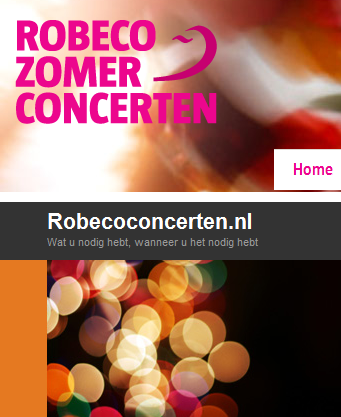Prima facie bewijs
WIPO Arbitration and Mediation Center 13 juli 2011, Zaaknummer: DNL2011-0035, (Robeco Groep N.V. tegen Bahnhofsgaststaette), Arbiter: Alfred Meijboom
 Eiser is Robeco Groep, een wereldwijd opererende fondsinvesteerder en houder van woord-/beeldmerken waaronder ROBECO (Benelux en Gemeenschapsmerk) al 20 jaar sponsor en organisator van de Robeco Zomerconcerten. Verweerder genereert traffic voor zijn website met gesponsorde links, houder van domeinnaam <robecoconcerten.nl>.
Eiser is Robeco Groep, een wereldwijd opererende fondsinvesteerder en houder van woord-/beeldmerken waaronder ROBECO (Benelux en Gemeenschapsmerk) al 20 jaar sponsor en organisator van de Robeco Zomerconcerten. Verweerder genereert traffic voor zijn website met gesponsorde links, houder van domeinnaam <robecoconcerten.nl>.
Verweerder reageert niet. Omdat verweerder niet in Nederland verblijft of is geregistreerd is de voertaal Engels ex 17.2 Regulations. Verwarringwekkende overeenstemming, Geen recht of legitiem belang én registratie te kwader trouw: ja. Bewijslevering prima facie: geen licentie, geen authorisatie, geen eerder gebruik of legitiem non-commercieel gebruik. Overdracht bevolen.
Onder A. Identical or Confusingly Similar. (...) The addition of a descriptive element does not prevent confusion (e.g., ANWB B.V. v. Lotom Group S.A., WIPO Case No. DNL2010-0072 and LEGO Juris A/S v. Nick Terlouw, WIPO Case No. DNL2011-0023).
Onder B. Rights or Legitimate Interests (...) This condition is met if Complainant makes a prima facie case that Respondent has no rights or legitimate interests, and Respondent fails to rebut that showing, by, for example, providing evidence of one of the three circumstances mentioned in article 3.1 of the Regulations (e.g., Technische Unie B.V. and Otra Information Services v. Technology Services Ltd, WIPO Case No. DNL2008-0002 and LEGO Juris A/S v. M. Moench, WIPO Case No. DNL2009-0052).
The Panelist understands that Complainant has not licensed or otherwise authorized Respondent to use the ROBECO trademarks or Trade name. Nor could the Panelist find any indication that Respondent, (Regulations, article 3.1 (a)) before having been notified of the dispute, made demonstrable preparations to use the Domain Name in connection with a bona fide offering of goods or services, (Regulations, article 3.1 (b)) is commonly known by the Domain Name, or (Regulations, article 3.1 (c)) is making a legitimate noncommercial use of the Domain Name.



























































































